The Biggest Obstacle To Ending The Shutdown Is Donald J. Trump
If you're looking for the biggest obstacle to a resolution to the government shutdown, look no further than President Donald J. Trump.
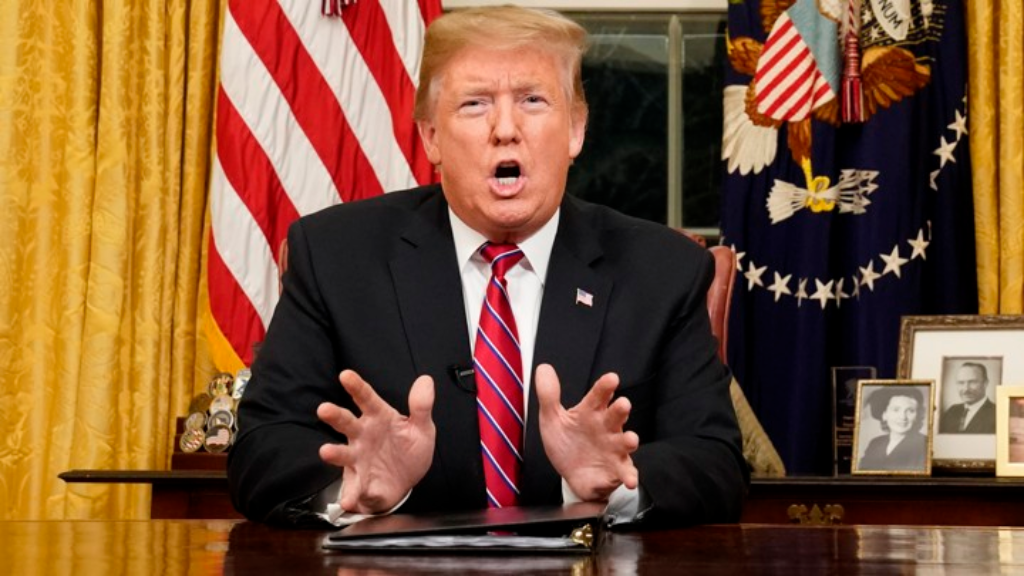
As the government shutdown enters its twenty-third day with no conceivable end in sight, it’s quickly becoming clear that the biggest obstacle to resolution is the President of the United States himself:
WASHINGTON — Officially, Republicans blame Democrats for what is now the longest government shutdown in the nation’s history. Privately, many concede, the stalemate over President Trump’s demand for a border wall has been made exponentially worse by White House ineptitude on Capitol Hill, where two years of contradictory statements and actions have built up a profound lack of trust.
Republican lawmakers and aides worry that Mr. Trump has misunderstood Democrats’ incentives to stand firm and that he has deputized the wrong aides to press his case. And they question who — if anyone other than the president — has the authority to resolve the impasse. They describe a dysfunctional dynamic where even senior leaders in Mr. Trump’s own party never know quite what to expect from the president.
“It’s always difficult when the person you’re negotiating with changes their mind — including my wife,” said Senator John Cornyn, Republican of Texas, when asked about the consequences of Mr. Trump’s penchant for doing so.
Mr. Cornyn noted that in the days before the shutdown began on Dec. 22, he and every other senator had voted for a stopgap government spending measure that omitted wall funding, believing that the president supported it, only to learn later that Mr. Trump had no intention of doing so. The president’s about-face — and House Republicans’ decision to add $5.7 billion in wall funding to the Senate bill — precipitated the shutdown, which reached Day 22 on Saturday.
“My understanding was that the president was going to sign that, but apparently he changed his mind,” Mr. Cornyn said.
Such miscues and abrupt changes of course have become a staple of Mr. Trump’s dealings with Congress. The president has now repeatedly undercut Vice President Mike Pence, to whom he has delegated the task of negotiating an end to a seemingly intractable stalemate.
Mr. Pence denied on Thursday that he had ever told lawmakers that Mr. Trump would sign the bill, pressed personally by the majority leader, Senator Mitch McConnell of Kentucky, to keep the government open without funding for the wall.
“I said the president hasn’t made up his mind,” Mr. Pence said.
But that is not how Republicans remembered it. “He got off to a bad start; he kind of pulled the rug out from under McConnell’s feet there with that one,” said Representative Francis Rooney, Republican of Florida.
It happened again on Thursday. A group of Republican senators were trying to forge a deal to pair wall funding with legal status for undocumented immigrants brought to the United States as children, often known as Dreamers. Then Mr. Pence told them that their effort would not earn Mr. Trump’s support, effectively torpedoing the talks. Members of the group said they recognized that their proposal would rise and fall according to the whims of the president.
The fact that Trump is the central cause of this shutdown isn’t really all that surprising given the manner in which he has behaved repeatedly during his Presidency. In 2017, for example, Trump declared victory in the White House Rose Garden when the House passed a health care reform bill only to turn around and call it “mean” a month later. In the days leading up to what ended up being the first of three government shutdowns that occurred in 2018. In early January 2018, the Senate was trying to come up with a way to pass a budget while at the same time dealing with a Democratic caucus that was demanding some action to protect the beneficiaries of the Deferred Action for Childhood Arrivals (DACA) program. Roughly a week before that January shutdown, the President held a bipartisan meeting with Members of Congress and the Senate in which he essentially told them to go back and come up with a proposal to fix the DACA issue and stated that he would sign whatever they came up with. Within a matter of days, Senators Lindsey Graham and Dick Durbin had come up with just such a proposal that appeared to have broad bipartisan support. When they went to the White House to present that plan to the President, though, they found their proposal being rebuffed. This is the same meeting at which the President made his now infamous comments about immigrants from “shithole” countries. It was at that point, that things in the Senate started going downhill and led to the shutdown that ended on Monday. As Senate Majority Leader Chuck Schumer put it over the weekend, negotiating with this President is like negotiating with Jello. After the shutdown was over, as Congress sought to put together a budget deal, Trump again threatened a shutdown in February, but those threats were ultimately ignored. The President’s threats of a shutdown were renewed over the summer, and then again after the election as Congress returned to Washington to deal with the budget and other lame duck issues. This has been consistent behavior throughout Trump’s Presidency. Even when he makes a clear and unequivocal statement on what he might accept in legislation, it’s become inevitable that the White House or Trump himself will walk it back.
We’ve seen the same thing in connection with this shutdown. In early December, the President told incoming Speaker of the House Nancy Pelosi and Senate Minority Leader Chuck Schumer that he would gladly accept and take credit for a shutdown over funding for his border wall. As the December 21st deadline approached, though, Trump appeared to back away from his eagerness for a shutdown and apparently gave approval to the bill that the Senate passed unanimously that would have kept the government open until February 8th. Just days later, though, after criticism from the likes of Rush Limbaugh and Ann Coulter, and the hosts on Fox News Channel, Trump pulled the rug out from under Republicans and stated that he would not agree to any budget bill that did not include funding for his border wall. Since the shutdown, he has repeatedly undercut his own Vice-President and Acting Chief of Staff, who have presented apparent compromise proposals to Democrats only to see the President repudiate them either in a public statement to the media or via Twitter. It is because of all of this that we find ourselves in the midst of the current shutdown, and it is because of the fact that the President cannot make a decision that negotiation is proving to be impossible.
Whether or not this shutdown, which technically only impacts about one-quarter to one-third of the Federal Government, qualifies as a “crisis” or not depends, I suppose, on your point of view. Compared to previous shutdowns that impacted essentially the entire government, it certainly is having an impact on a far smaller percentage of the Federal workforce and a smaller degree of Federal operations than those other shutdowns. That being said, if you’re one of the roughly 800,000 or so Federal workers who are being impacted by this, whether you’re one of the “non-essential” personnel who are being told to stay home or one of those “essential” personnel who are being required to work even though there’s no prospect of getting paid for your work until some point after the government actually opens back up. The same goes for the countless numbers of large, medium, and small businesses who are Federal contractors, or individuals working in the affected Federal agencies as contractors, who are also being impacted by the shutdown and the lack of pay. In the meantime, of course, these people still have bills to pay, and there are still government functions that are being impacted by the shutdown at the Internal Revenue Service, the Federal Aviation Administration, the Food & Drug Administration, the Transportation Security Agency, the Federal Courts, and countless other agencies. The longer this shutdown goes on, and on that note, the White House is reportedly planning for a shutdown that lasts through the end of February (which would mean up to 69 days), this impact will just get worse. And it will all be Donald Trump’s fault.

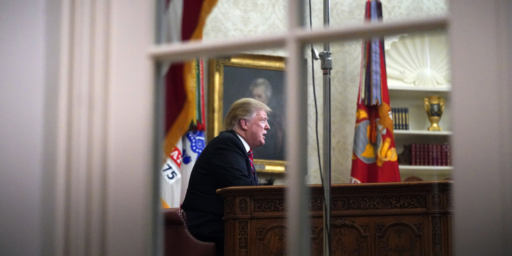
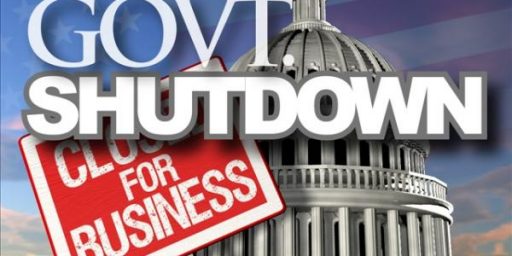
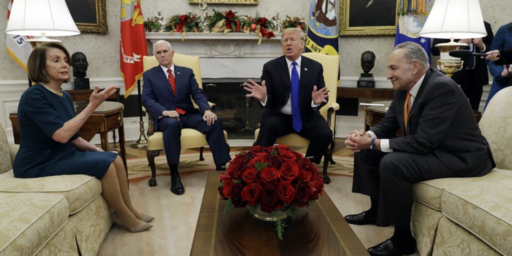
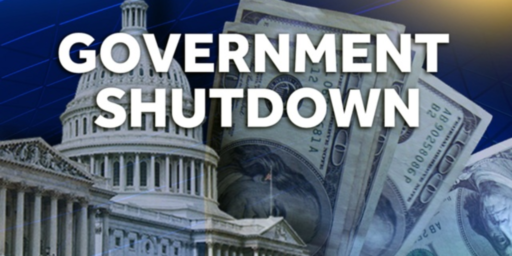
Yup.
This is typical of negotiations with hostage takers, and particularly where the hostage taker is (mentally) unbalanced.
McConnell is acting (in refusing to allow the Senate to vote on the House funding bills) as a accomplice to the hostage taker. He is just as culpable in this corruption of democracy principles.
It is immaterial what was done by previous administrations, current bad behavior is not excused by previous bad behavior. So spare me the ‘but so and so did this before’.
release me please
You aren’t giving McConnell near enough credit, Doug.
Trump and McConnell are essentially green lanterning, as if just wanting to win (or at least not lose) badly enough and persisting long enough they must prevail.
I think the chances that Trump eventually gives in are slim. Given no help from Trump, the resolution must be that Congress just passes something and, should it be necessary, overrides a veto if that’s what it takes. That would damage the GOP badly though, so McConnell shows no sign of biting that bullet. The thing is, no resolution is also damaging to the GOP. McConnell just needs to accept that he has no winning option, how long that takes, who knows?
@OzarkHillbilly:
This. Trump may be the biggest obstacle, but he is not the only obstacle.
Co-equal branches of government is the design. I’m not saying the House bills will pass the Senate or if there are enough votes to override Trump’s inevitable veto. But, it’s not even being tested. McConnell is putting it all on Trump, because Trump is farthest removed from public pressure. The Legislature is designed to be closer to the people with the intent that they would respond to what the people want.
By the way, it’s kind of misleading to say only a quarter of the government is shut down. Most of what is not shut down is defense and veteran’s affairs. Apart from defense and veteran’s affairs, most of the government is shut down.
Here and there on the web you come across Dennison supporters in comments sections, or posts in other blogs or Facebook. I’ve found a lack of sympathy from them towards the federal employees not getting paid.
Some are downright callous, along the lines of “they knew a shutdown was a possibility when they signed up.”
Years ago my work included doing the payroll. One rule in that company was that employees got paid first, regardless of what other payments were due. This was eminently sensible. You can get credit from the fabric supplier, or the guy who repairs the sewing machines, but not from the employees paid weekly. The former have sources of income other than you, the latter most often do not. I’ve found this attitude to be common in other companies. In fact, if you want to know whether you should worry about a company’s finances, an indicator is they are missing payroll payments.
I’m not suggesting one should judge the fiscal fitness of the US government by this metric, not yet, but it points to what a big blunder it is. It brings to mind the words of Talleyrand regarding an atrocious act by Napoleon, “It was worse than a crime. It was a mistake.”
John Tester takes down Mitch McConnell.
https://youtu.be/QYj-3FZ7HgI
@Scott F.:
Should be repeated hourly by congresscritters!
Similarily: The Legislature was not designed to protect the president.
@Bob@Youngtown:
What we find is that party is a bridge across separated institutions and therefore it is not the legislature that is protecting the president, it is the party.
Two things worth noting from today which I think are significant moves:
1. Lindsey Graham is now supporting passing the continuing resolution and then negotiate.
2. Trump, after taking DACA off the table, is suddenly tweeting about it as a bargaining point.
Both of those are pointing us toward more and more cracks in Republican resolve.
It’s worth noting that #2 also continues Trump’s longstanding habit of undercutting his own negotiating team.
@mattbernius: I and most DEMs I know would take that deal, but I suspect once Nancy and Chuck agreed he would just move the goal posts by demanding more. Like he did the last time they proposed that deal.
@OzarkHillbilly:
That’s probably the case. But it’s in their best interests to still persue it.
I personally wish they were talking about DACA and immigration reform more publicly right now — i.e. saying we can negotiate if he puts them on the table. That said, I do wonder if one of the reasons they haven’t been mentioned is because they know that if they (the Dems) bring that up then the opportunity for that reform is DOA.
Either that or they are following negotiation strategy and are using silence (and growing outside pressure) to make the person across the table negotiate against themselves.
@mattbernius:
Definitely, and yes, trump needs to bring it up. Not Pence, not Kushner, not Graham, not anybody not named donald j trump. Anybody else will just get cut off at the knees.
Pretty sure there is a certain amount of that going on too. When your enemies are digging their own graves, get out of the way.
One minor error I think the Congressional Dems have made in this is that instead of meeting to “negotiate” (which conceeds the Trump narrative that there is a disagreement that still needs to be resolved), the emphasis should have been that House, Senate, and President had an agreement before the shutdown that Trump backed out on at the last minute, and if he’s not going to do what he promised to do just a week ago, there’s no point in further negotiations (stressing the narrative that the actual problem is the President’s bad faith).
Considering that McConnell was roped into the first attempt and then left with egg on his face when Trump reneged, I’m wondering if this isn’t a very fine hand he’s playing…
He’s refusing to let the Senate vote right now, but I think there will be more and more pressure and more and more cracks in the wall. Rather than a series of votes, he may be waiting until there are enough Republican votes to hit Trump hard with a lack of support.
P.S. I still think that removing all janitorial and housekeeping services from both the White House and Congress, plus grounding Air Force One would concentrate minds considerably….
@Steven L. Taylor:
Steven, what ever the motivation (and I would suggest that the motivation is the perpetuation/credibility of the Republican party), the action taken by McConnell, is intended to avoid placing Trump in the awkward position of actually vetoing spending bills that would allow government workers to be paid as they should.
Whether the spending bills would be approved by the Senate or not (forcing individual Senators to give a big FU to their constituents) can not be tested by Prince McConnell refusal to allow consideration. Consideration of the House spending bills is, in fact, the Senate’s job.
I think The NY Times report of the FBI wondering if Trump was a Russian asset, means that this shutdown will take a few dramatic turns over the next few days.
Not that it will be solved, just that Trump will be actively using it to generate news that isn’t Russia. He will want a “win” more than ever.
And, it’s a good sign that Trump is going to do a lot of damage on his way out the door — whether he leaves by being voted out, or is pushed out.
@Scott F.:
That was the intent, but it doesn’t seem to be working out all that well. On the other hand, legislators are very responsive to lobbyists, and every day that goes by, more lobbyist clients are getting hurt. I suppose there’s someone, but I can’t see who would be lobbying for the wall and the shutdown.
@Gustopher:
I’m very concerned about some poo flinging Trumperdammerung. But what are we to do? Stop the Mueller investigation and leave a suspected Russian asset in the presidency? It’s a risk we have to take.
On the other hand, legislators are very responsive to lobbyists,..
“Rich people march on Washington every day.” I. F. Stone
@gVOR08: Oh, the Shit-Gibbon has to go. The sooner the better.
I suspect that he will hang on through his entire term, though, because of Republican support, and will be causing absolute chaos while running for re-election. Just something to think about while contemplating the Democratic Primary — who can hit back and control the narrative.
(I love Elizabeth Warren, but she hasn’t done a great job of that, and has a lot to learn. She will have opportunities and will either succeed or fail long before the nomination is decided. She’s amazing when she can get people to listen, but not so good at getting people to listen.)
Meanwhile, people looking for a rational way out of the shutdown are going to be disappointed if they are thinking this is really about a wall or border security. This is about Trump, trying to control the narrative.
Not sure what can be done about it. If you have a Republican Senator, start calling, even if you don’t think it will do any good.
(I continue to hope Trump just strokes out — incapacitated enough to have to resign, not so incapacitated that he doesn’t face the consequences)
seeing what a terrible negotiator he is, it’s easy to understand why it took him a quarter of a million dollars to have sex with two women.
@Teve: As a card-carrying female, let me state that $250k would be highly insufficient to get me anywhere near Trump for fornication purposes.
@Steven L. Taylor: @grumpy realist: 😛
@Gustopher: Off topic. But my new Senator Rick Scott did not have a working office telephone reachable through the Senate switchboard — at least as of Friday afternoon. I’ve been giving the Rubio answering machine considerable hell and want to make it a two-fer but Rick is dodging me.
So that business of legislators being closer to their constituents is, well, occasionally true. I suppose.